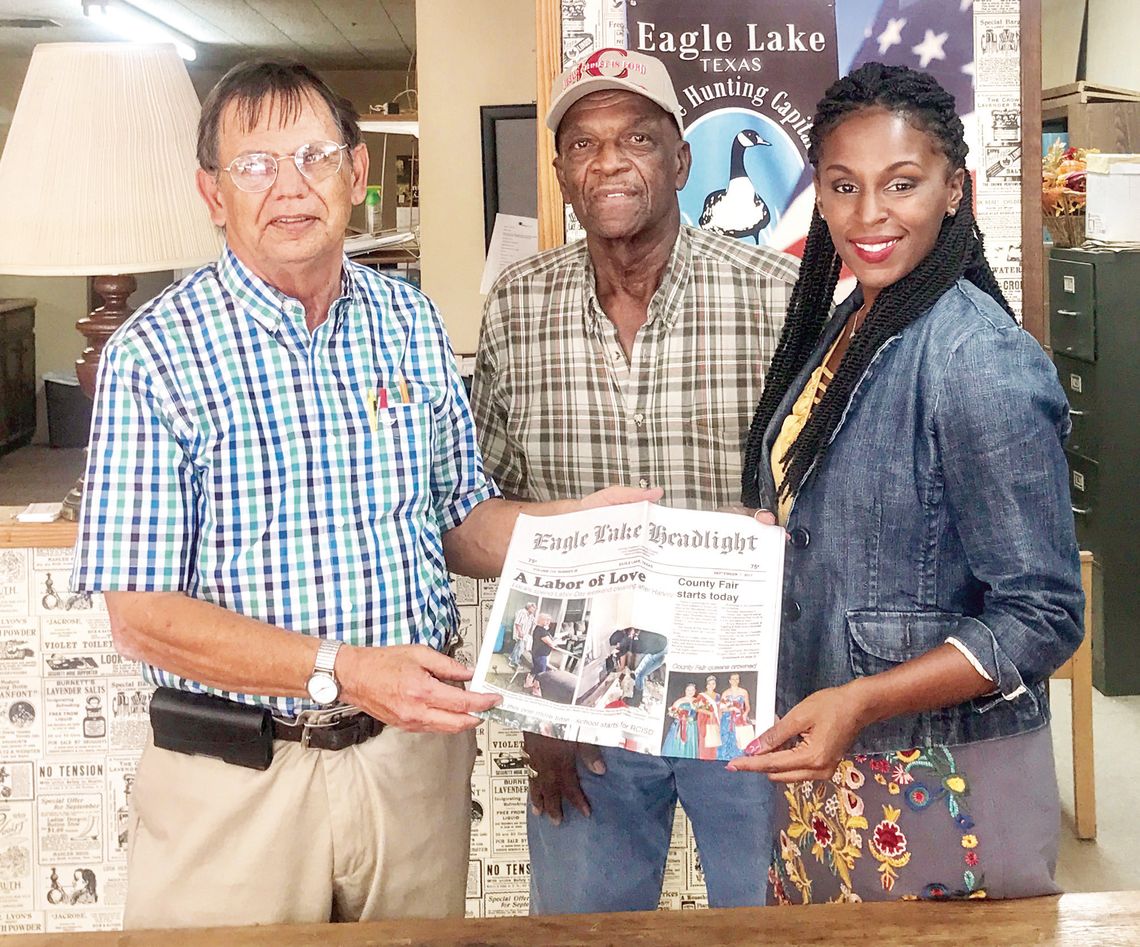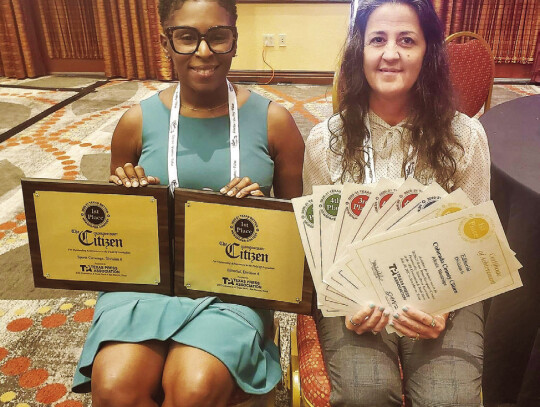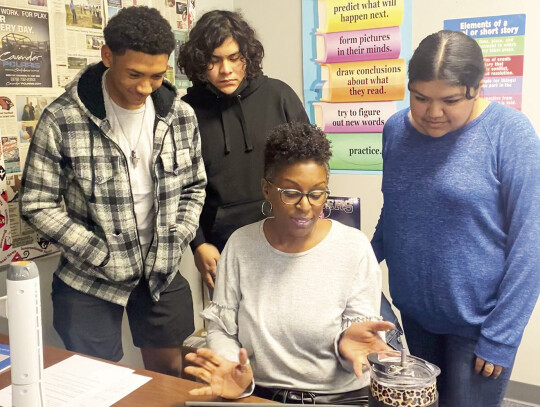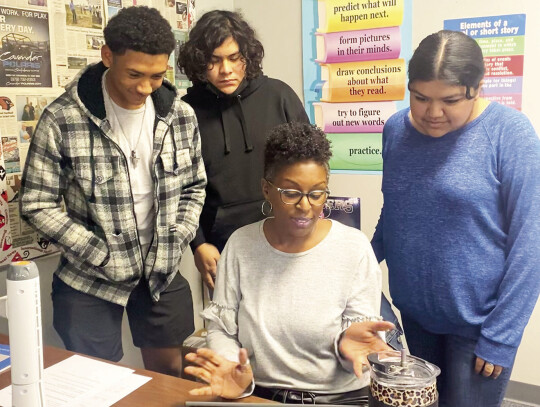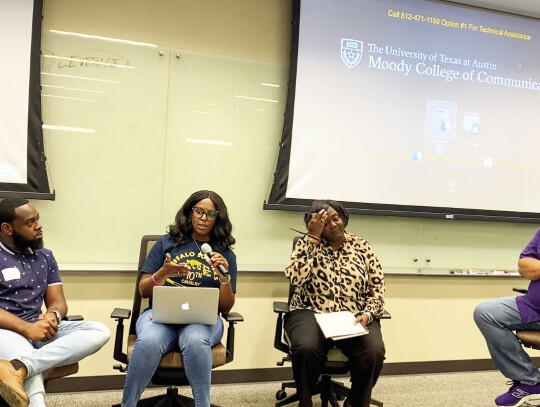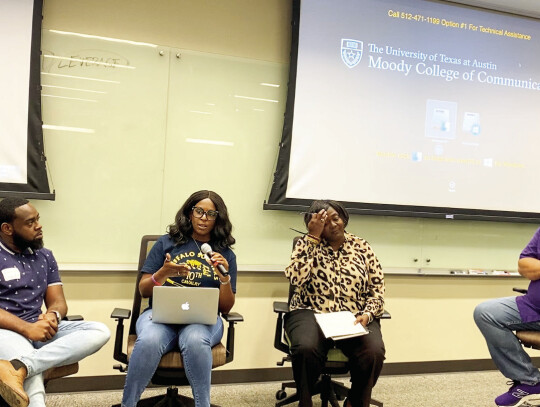The main purposes of journalism as an institution can mainly be boiled down to two things. For one, it can function as a watchdog, alerting communities of local politics, crimes and changes so the population can assess and address the covered topic accordingly. Another function is as a historical record of the community being covered. However, while much of the industry is based on recording others’ history, there are often notable and historical events that happen in the journalism world as well. Even in Colorado County, history is being made nearly daily behind the scenes of some of the most recognizable publications in the area. Longtime Eagle Lake resident and former professional journalist for both the Eagle Lake Headlight and the Colorado County Citizen, Alesia Woolridge, showcased just how impactful the history behind the history recorded in print can be. Woolridge made history as the first black person to become the managing editor and publisher of both publications as well as the first black owner of the Headlight. As a black woman, every mark of history she reached was twofold, becoming not just the first black person in the top positions, but also the first woman to reach many of those heights as well.
Woolridge’s story in journalism began long before she even had a desire to become a journalist. Before she had reached preschool age, Woolridge had already shown a propensity for writing. She enjoyed writing short stories which she would then implore her family to read. Her mother and sister, Robin, were the necessary support she needed as her love for writing had just started taking root. Her mother in particular was instrumental in giving Woolridge the necessary fundamentals and support as the school teacher encouraged her daughter to continue pursuing positive habits like reading and writing. Because of her mother’s teaching and influence, Woolridge was able to read and write at a much earlier age than average and was at an advanced reading level throughout her school years.
“I liked the escapism that I got from reading other people’s stories,” Woolridge said on her introduction to the proverbial world of pen and paper, “I was able to find that same escape in writing.”
Whi le Woolridge enjoyed writing, she merely kept it as a dear hobby and had no intent on making it her lifetime work throughout much of her school career. Things changed in high school when yet another school teacher influenced her writing trajectory. Around her junior or senior year at Rice Consolidated High School, her English teacher at the time, Jane Clipson, simultaneously praised Woolridge’s writing and encouraged her to pursue it as a career. Clipson and another teacher, Jane Van Landingham, were influential, female figures that pushed Woolridge in her academics.
“They provided the spark,” Woolridge said of her impactful high school teachers, “I was never able to let go of the urge to write.”
That is when things started to shift for Woolridge. Her writing passion was no longer in creating new stories purely from imagination, but in features highlighting the incredible stories of the people around her and especially black people.
“The history of black folks was largely undocumented in my community, mainly kept alive in oral stories passed down,” Woolridge said, “I wanted to help change that, and get our contributions documented as well, before the stories went to the graves with those who remembered them best.”
This would stand as her first foray into history-recording, and her understanding of that work’s importance was enhanced by her passion for black history.
After graduating Rice High School, Woolridge attended a few different universities where her story in journalism took another step forward. She learned all of the basics of news writing, strengthened her feature writing.
However, Woolridge did not jump directly to the newsroom from the classroom as she worked a few different jobs following her collegiate experience. After initially dropping classes, she completed her Medical Assistant Certification at around 24 years old. Her late 20s were spent working as a typing assistant for a state mental health institute in Brenham. She had no major complaints as the job helped her start her life after school, but it would never be able to satisfy her “urge” to return to her roots as a writer. After a while, the urge led her to take action as she finished her degree in her early 30s and applied for an editorial assistant role for a news publication called the Headlight in her hometown of Eagle Lake. The editor, publisher and owner at the time, Bruce Beal, made it very clear what Woolridge was signing up for during the interview process. Not only was journalism a time-consuming and often thankless career path, she also would be taking a significant pay cut to switch careers. None of that deterred Woolridge as she was determined to return to writing, as well as return to serve the community she was raised in.
“It’s not about the money,” she said to Beal during the hiring process, “I felt that pay cut, but it was what I wanted to do... I just knew I wanted to write.”
Truly there was no better place for Woolridge to get her journalism start than in the same town she grew up in at the same newspaper that she read throughout her life in Eagle Lake. In fact, the Headlight had already been established as the town’s premiere publication since its opening in the 1890s. For the longstanding pillar of community journalism, Woolridge’s hiring was the first of many historical moments involving her career in the community. She was the first black writer on the editorial staff in the Headlight’s history. While there was an adjustment period for Woolridge as well as the community, eventually she would become a trusted and known source of news in Eagle Lake.
The credibility she had built within the town was crucial after she set her next historical marker as a journalist. In 2014, she was named the first black managing editor for the Headlight, and one of a handful of women in the position. In 2016, her name and coverage spread even further throughout the county after she accepted the same position at the Colorado County Citizen, founded in 1857 and one of the oldest newspapers in the state. Once again, she made history as the publication’s first black person and one of a few women to claim that position in its 159 years in publication.
However, it seemed that more history was not far off in the horizon as just one year later, Woolridge left the Citizen after purchasing the Headlight from her mentor Beal. Simultaneously being the first black owner, publisher and managing editor of Eagle Lake’s flagship paper was no easy task for the one-person staff. With just one other fulltime employee as well as a part timer, many of the day-to-day tasks concerning both editorial and management fell to Woolridge’s shoulders to complete.
For two years, Woolridge kept up her torrid pace of working up to 90 hours a week just to keep the paper alive and producing new editions at the expected time every week. Unfortunately, despite her efforts, the paper was forced to close their doors permanently and immediately halted all production of the historic publication.
What Woolridge considered to be a failure at the time may have ended up being the biggest reason that led her back to another ship in the county that was trying to keep from sinking. At the same time as the troubles at the Headlight, the Citizen in Columbus was also having difficulties as the entire staff was relieved of duty by the corporate office at the time called Granite Publications, leaving no one on the staff to finish the paper for the Tuesday press deadline. According to Woolridge, Granite’s president, Daniel Philhower told her that he sat in the publisher’s office praying for a solution to quite literally walk through the door to help their seemingly hopeless situation. Just a few hours later, the solution quite literally walked through the door as Woolridge stopped by and inquired if they needed assistance without any knowledge of what had transpired earlier that day. With the help of the president and the corporate bookkeeper, Woolridge worked late into Monday night and all the way up until the press deadline on Tuesday afternoon.
In what was seemingly a miracle, the paper printed and dispersed without a hitch, a testament to the experience and ability Woolridge had developed throughout her years as a journalist. Philhower officially offered her back her old position as managing editor, and Woolridge moved forward, still serving her hometown community as well as the other towns that rest in Colorado County. In June 2020, Woolridge accepted the position of publisher, becoming The Citizen’s first black publisher.
She held the editor position until the Fall of 2022 when she was offered an opportunity to teach junior high technology and high school journalism in Rice CISD and create a new generation of journalists to carry the mantle. After having a plethora of impactful, female teachers including her mother in her own life, it was fitting that she would take their influence and bring something new to the same classrooms she found herself in as a teen.
Woolridge’s own influence is still felt in the community’s journalism. Even now, the Citizen has an all-black editorial staff in sports writer Trenton Whiting and general news reporter Shayla Kuykendall, both of whom received mentorship from Woolridge as they pursued their own journalism careers. Woolridge has made a lasting impact on journalism in the county, and her contributions to black history are of the same kind that would have fascinated her as a high school student in the same town she continues to serve.
.jpg)

